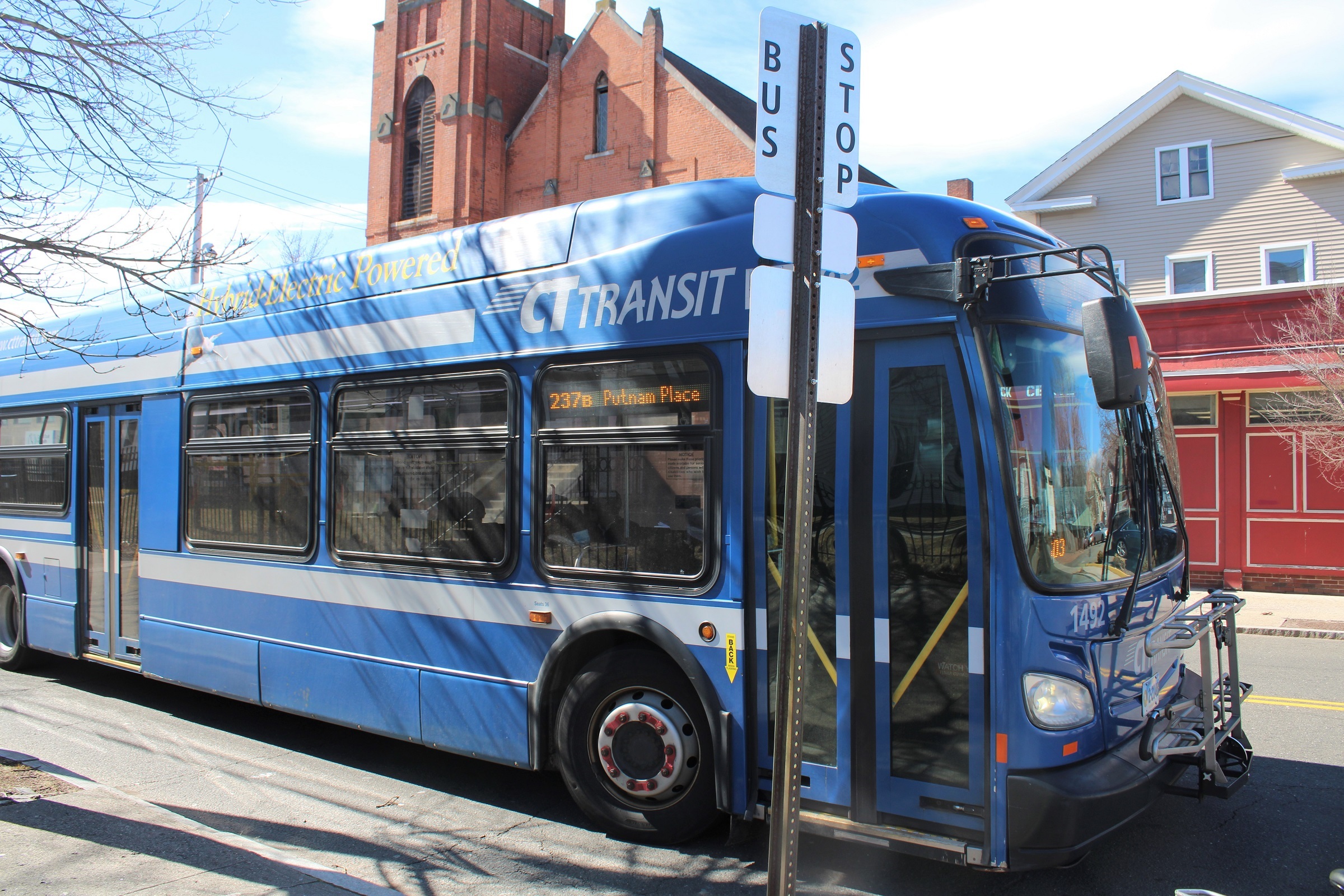
Thomas Breen file photo
Riding the bus up Dixwell ...

Thomas Breen photo
... to be made faster, cleaner, more efficient, thanks to Bus Rapid Transit program, as described by state transit chief Garrett Eucalitto Thursday.
City, state and federal officials took a victory lap Thursday at a politician-packed press conference celebrating a new $25 million grant that will speed up and electrify bus travel on Dixwell, Grand, Whalley, Congress and Columbus Avenues.
Roughly 100 people gathered in the air-conditioned Q House gymnasium at 197 Dixwell Ave. to fête the announcement of that $25 million federal grant from the Rebuilding American Infrastructure with Sustainability and Equity (RAISE) Discretionary Grant program that has been awarded to the state Department of Transportation (DOT).
That money will be put towards one of the biggest ticket items on the state-funded, decade-in-the-making, 2019-completed Move New Haven transit study: creating a new on-street Bus Rapid Transit (BRT) system along the city’s most heavily trafficked public transportation corridors.

As state DOT Commissioner Garrett Eucalitto explained Thursday, this money will go towards creating dedicated bus lanes, transit signal priority traffic lights (that is, lights that change to green when they detect a bus approaching), 18 new stops, and four elevated and covered “mini-hub” stations for new express bus routes to run along Dixwell Avenue, Whalley Avenue, Grand Avenue, and Congress-Columbus Avenues.
The new routes will stretch into Hamden to the north and West Haven to the south, will be serviced by 15 new electric buses, and will ultimately be run by CTtransit.
The BRT system won’t replace any existing bus routes in New Haven, Eucalitto said, but instead will be “overlaid” on top of the existing network. He said it will provide a safe, convenient, accessible, quieter, and more environmentally sustainable public transit option for routes that currently carry almost half of all bus traffic in the city.

U.S. Rep. Rosa DeLauro at the center of a packed presser.


This on-road BRT system “means that you will have access to more jobs, more educational opportunities, more healthcare, more supermarkets, more shopping. You can get there faster and easier than you could before.”
Eucallito described New Haven’s coming new BRT system as analogous to what the Hartford-New Britain area has in CTfastrak, a “crown jewel of BRT in the country, and in the world.”
New Haven’s BRT system will take another few years to design, he said. Construction should begin in 2026 and be completed by 2029. It’s going to cost a total of $150 million to build, and, in addition to this $25 million federal grant announced on Thursday, will be funded through “other formula funds” and “close to $50 million state funds,” some of which is expected to be approved by the State Bond Commission on Friday.

Gov. Lamont: "New Haven's going to be the center of the universe."

State Rep. Lemar: "Generations of better service for all New Haven residents."

Mayor Elicker: "BRT is a BFD."

U.S. Sen. Blumenthal: "You don't need a car. And if you have a car, you don't need to use it."
“It’s hard to imagine anything more integral to day-to-day life than safe and reliable transportation,” U.S. Rep. Rosa DeLauro said on Thursday, as she charted the yearslong path from a 2014 DataHaven study about jobs and public transit in the region to the 2019 completion of the Move New Haven transit report to the current landing of this competitive federal grant. This BRT system will shave 11 minutes off of the commute from New Haven to Hamden, and 11 off the commute from New Haven to West Haven.
DeLauro quoted former Mayor Toni Harp, who was in attendance at Thursday’s presser and who championed the Move New Haven study, by saying: “Transportation is a civil rights issue. It is an economic development issue. And it is a jobs issue.”
“She was right,” DeLauro said. “Our city needs reliable bus service that runs where our residents live and where they work, and that is what this funding is all about.”

Kai Addae.
Amid a lineup of speakers that included DeLauro, Eucalitto, Mayor Justin Elicker, U.S. Sen. Richard Blumenthal, Gov. Ned Lamont, State Rep. and Transportation Committee Co-Chair Roland Lemar, among others, city safe streets advocate Kai Addae weighed in on the impact that this type of BRT program can and will have on the lives of the quarter of New Haveners like her who don’t own a car.
“When I moved to New Haven, I fell in love with the city for many reasons. One of them was not the transportation system at the time,” she said. It was hard to get to her doctor’s office in West Haven on the bus. She’d be late to work trying to ride the bus.
“Projects like this will help make traveling across our city without a car reliable, efficient, green,” she said. “People can ride the bus. It will be fast. It will be reliable. It will be convenient … This means we’re going to have frequent, fast, electric buses that can get people to where they need to go.”

Eucalitto and Dwight Alder Frank Douglass in front of the proposed BRT maps.
